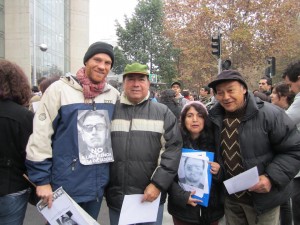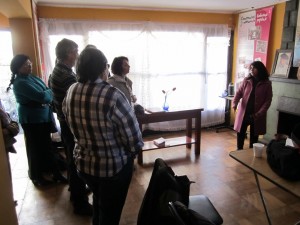The happy historian (Part 2): Degrees of history
04 January 2013 – Zachary McKiernan
graduate students, advocacy, public engagement, community history, memory, museums, scholarship, human rights, profession
Continued from Part I.
I recently watched a documentary on, of all things, happiness. The film, “Happy,” focused on the study of happiness (positive psychology) and what makes people happy and when, along with the intrinsic and extrinsic factors that contribute or detract from happiness. One assertion is that being connected to a community or collective, being engaged in social interaction, with something to give and care about makes people happy. The documentary’s happy doctors (Ph.Ds. in psychology) demonstrate that social bonding inhibits self-interest and cooperation (and even competition) induces the better-than-drugs release of dopamine—a natural agent that makes us all smile with weak knees and big hearts.
I suspect that the readers of these words have also questioned happiness or being happy–specifically, being happy with the solitary process that constitutes the core of historians’ identity. Historians, particularly those with formal academic training, tend to flirt with long bouts of solitude. We spend countless hours, equating to days and then weeks, alone. We read and research alone. We roam the archives and libraries alone. We think and write alone. With few exceptions, our fantastic historical forays down the rabbit hole are mostly solitary pursuits. Sure, we share ideas or bounce ideas off colleagues, we meet once or twice a week to discuss linguistic turns and to knock down to size those who came before us, we wrestle with staff meetings and trainings, we teach the next generation’s eager young historians; we may even wander out “there” for a conference or, gulp, social engagement. But as deadlines near, as the path down the rabbit hole clears (re: becoming more complex), the solitude becomes more severe, the dopamine more dormant.
Before “Happy” but after my public history tenure in Chile, I began the writing process, that dissertation experience that we all love to struggle with and against, the wasteland between the euphoria of advancing to candidacy and the anxiety of landing a job. But writing is a lot more than simply writing in a wasteland. It is the distillation of sources, the interpretation of field notes, the creation of a narrative; the writing, or re-writing as it were, of history.
It is also very solitary. Although this process makes historians as/and academics distinct (and maybe a little disconnected), it isn’t always a bad thing. In fact, working and being alone is a very liberating experience, though I find it equally inhibiting, even self-serving, especially in a world where people are struggling with the realities of history (trauma, terror, injustice, unemployment, stigma and so on) while others, like me, struggle to get history degrees.
Not surprisingly, all of this got me thinking about happiness in the pursuit of history, and historians and the production of history. It wasn’t so much about what history is or how history works or why history? It was much more basic, a fundamental question that gets at the core, I think, of an historian’s identity: why do we do history? When I remember to reflect on the basics of why I do history, I put in better perspective my own degrees (of happiness and history) as an historian.
When I was in Chile, I began volunteering at Nido 20 Casa Memoria: Alberto Bachelet Martinez, a small house museum at a former clandestine transfer and torture center under Augusto Pinochet. Nido 20’s activist-historian Erica Spuler and I set out to identify the estimated 40 prisoners who passed through it, the circumstances of their arrests, detentions, and, in some cases, death. At the same time, we looked at the perpetrators responsible for these crimes, their organization Comando Conjunto, and the network of clandestine sites they operated. This work would help give form to the narrative told at the museum.
Although this site’s silenced stories seem the antithesis of happiness, our work was the antidote. Doing history at Nido 20 meant more than doing history in any academic sense. It meant being part of a collective, a community of committed activists. It meant going to municipality meetings, mingling with Nido 20’s neighbors on bingo night, and lunching for long hours for the simple sake of lunching for long hours. It meant listening to stories of dictatorship and exile, but much more about everyday experiences and stories, the needs of the neighborhood, the next student march or election, the reflections of and reactions to the now.
The activists taught me more about the organizing and solidarity efforts necessary to history-making than any seminar in our academic tower (of solitude?). In Nido 20’s world, neither academic degrees nor deadlines were a high priority. The Human Rights committee in charge of the house museum isn’t a group of Ph.Ds. or even professionals; they don’t spend their time talking about this theory or that, debating post-modern currents or linguistic turns. They’re simply the noblest of people—a taxi driver, a retiree, a former high school history teacher—doing real things without many resources but with a moral and political conviction to the past, present, and the future. In this sense, and within the company of the compañeros, I always felt much more a part of a (hi)story than an interloper interjecting “academic sensibilities” in to it.
The simple fact is that I am happiest as an historian in situations like this, as part of a collective rather than as an individual in a solitary wasteland. And as important as my dissertation is, a new view that focuses on the intersection of public history and human rights through public memorials, it pales in comparison to the humanistic historic work happening at Nido 20. This might not be news for public historians, those who ply their trade in sometimes difficult public spheres. But it could be a reminder to remember to ask ourselves: why are we doing history? And what makes us happy doing it? For me it isn’t the degrees that could adorn an office wall. Nor it is the academic domain punctured by deadlines and solitude. Instead, it is the dopamine that flows in a small house-musuem of activists talking collectively about how to get things done, talking history, talking justice, and walking that talk.
~ Zachary McKiernan is a doctoral candidate in the History Department at the University of California at Santa Barbara. His multi-part series Letters from Chile, focusing on his dissertation research, ran earlier this year.






1 comment